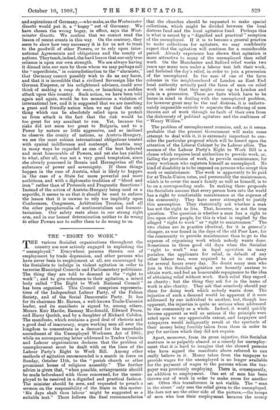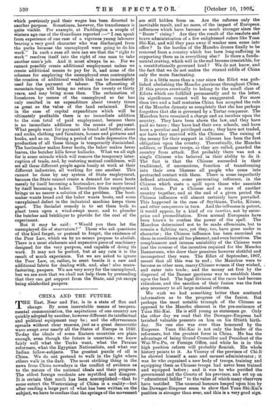THE " RIGHT TO WORK."
HE various Socialist organisations throughout the
• country are now actively engaged in exploiting the " unemployed." Everywhere persons thrown out of employment by trade depression, and other persons who have never been in employment at all, are encouraged by the Socialists to indulge in violent agitation in order to terrorise Municipal Councils and Parliamentary politicians. The thing they are told to demand is the "right to work !' ; and to give coherence to their agitation, a mixed body called "The Right to Work National Council" has, been organised. This Council comprises representa- tives, of the Independent Labour Party, of the Fabian Society, and of the Social Democratic Party. It• has for its chairman Mr. Barnes, a well-known Trade-Unionist leader, and its manifesto is signed by, among others, Messrs. Keir Hardie, Ramsay Macdonald, Edward Pease, and Harry Quelch, and by a daughter of Richard Cobden. The manifesto, which contains a good deal of rhetoric and a good deal of inaccuracy, urges working men all over the kingdom to concentrate in a demand for the immediate amendment of the Unemployed Workmen Act of 1905; while an accompanying letter addressed to Trades Councils and Labour organisations declares that the problem of unemployment must be dealt with on the lines of the Labour Party's Right to Work Bill. Among other methods of agitation recommended is a march in force on Sunday, October 11th, to the " parish church or other prominent house of religious assembly." The further advice is given that, "when possible, arrangements should
be made beforehand with those concerned,.for the unem- ployed to be received in a dignified and practical fashion. The minister should be seen, and requested to preach a sermon on the responsibility of the State in this matter. ' Six days shalt thou labour' might be suggested as a suitable text." There follows the final recommendation
that the churches should be requested to make special collections, which might be divided between the local distress fund and the local agitation fund. Perhaps this is what is meant by a " dignified and practical " reception of the unemployed. If it is to become a. general practice to make collections for agitators, we may confidently expect that the agitation will continue for a considerable period. Already experience has shown that agitation is more attractive to many of the unemployed than relief work. On the Manchester and Salford relief works two years ago many men under a labour test left their work, 'and forfeited the day's relief, in order to join a procession of the unemployed. In the case of one of the farm colonies in the neighbourhood of London an East End• local authority actually paid the fares of men on relief work in order that they might come up to London and join in a procession. These are facts which have to be borne in mind in dealing with the unemployed problem, for however great may be the real distress, it is unfortu- nately impossible entirely to separate the suffering of men thrown out of work through no fault of their own from the dishonesty of political agitators and the craftiness of " Weary Willies."
The problem of unemployment remains, and, as it seems probable that the present Government will make some attempt to deal with it, it is extremely important to con- sider the particular proposal which will be forced upon the attention of the Liberal Cabinet by its Labour allies. The essence of the Labour Party's Right to Work Bill is a clause which requires local authorities to provide work, or, failing the provision of work, to provide maintenance, for every .workman who registers himself as unemployed. No kind of disability is to be imposed on persons who accept this work or maintenance. The work is apparently to be paid for at Trade-Union rates, and presumably the maintenance, which is to cover the man's family as well as himself, is to be on a corresponding scale. In making these proposals the Socialists assume that every person born into the world has a right to comfortable maintenance at the expense of the community. They have never attempted to justify this assumption. They rhetorically ask whether a man has not the right to live. That, however, is not the true question. The question is whether a man has a right to live upon other people, for this is what is implied by the alleged " right to work " or " right to maintenance." The two claims are in practice identical, for it is general!y cheaper, as was found in the days of the old Pooi• Law, for the community to provide maintenance than to go to the expense of organising work which nobody wants done. Sometimes in those good old days when the Socialist " right to work" was in legal operation in many parishes the applicants for relief, iu default of any other labour test, were required to sit in one place for several hours every day. No doubt many men who join in this Socialist agitation are honestly anxious to obtain work, and feel an honourable repugnance to the idea of obtaining relief without work. Such relief they regard . as charity ; but the thing they ask for in the name of work is also charity. They ask that somebody should pay them for doing work which nobody wants done. The injustice of such a demand would be apparent if it were addressed by one individual to another, but, though less apparent, the injustice is quite as serious when addressed to the community as a whole. Indeed, it would quickly become apparent as well as serious, if the principle were acted upon to any appreciable extent, and taxpayers and ratepayers would indignantly revolt at the spectacle of their money being forcibly taken from them in order to pay for services which they did not require.
Apart, moreover, from its gross injustice, this Socialist nostrum is so palpably absurd as a remedy for unemploy- ment that it is bard to imagine that the shrewd persons who have signed the manifesto above referred to can really believe in it. Money taken from the taxpayer to provide wages for the unemployed is no longer available for the payment of wages to the persons whom the tax- payer was previously employing. There is, consequently, no addition to employment. One set of men has been thrown out of work in order to make room for another set. Often this transference is not visible. The " man in the street " only sees the relief given to the unemployed. He does not see the other side of the picture,—the troops of men who lose their employment because the money which previously paid their wages has been diverted to another purpose. Sometimes, however, the transference is quite visible. For example, at Paddington a couple of winters ago one of the Guardians reported :—" I can speak from experience of one case of a vigorous young labourer bearing a very good character who was discharged from the parks because the unemployed were going to do his work." In such a case all men can see that the " right to work " resolves itself into the right of one man to take another man's job. And it must always be so. For we cannot possibly create additional employment unless we create additional means to pay for it, and none of the schemes for employing the unemployed even contemplate the creation of additional wealth that can be immediately used for the payment of labour. The afforesting of mountain-tops will bring no return for twenty or thirty years, and may bring none then. The reclamation of foreshores by means of the unemployed so far has only resulted in an expenditure about twenty times as great as the value of the land reclaimed. Even in the case of capital expenditure which will be ultimately profitable there is no immediate addition to the sum total of paid employment, because there is no immediate addition to the means of payment. What people want for payment is bread and butter, shoes and socks, clothing and furniture, houses and pictures and books, and so on. During a period of trade depression the production of all these things is temporarily diminished. The bootmaker makes fewer boots, the baker makes fewer loaves, the butcher kills fewer bullocks. What we all sigh for is some miracle which will remove the temporary inter- ruption of trade, and, by restoring mutual confidence, will set all these different people again busily at work at their different industries, all working for one another. This cannot be done by any system of State employment, because the State cannot create a demand for more boots merely by itself becoming a bootmaker, nor for more bread by itself becoming a baker. Therefore State employment brings us no nearer a solution of the problem. The boot- maker wants bread and the baker wants boots, and some unexplained defect in the industrial machine keeps them apart. The Socialist remedy is to set them both to plant trees upon a wind-swept moor, and to plunder the butcher and bricklayer to provide for the cost of the experiment. But it may be said : " Would you then let the unemployed die of starvation ? " Those who ask questions of this kind forget, or pretend to forget, the existence of the Poor Law, which we by no means propose to abolish. There is a most elaborate and expensive piece of machinery designed for the very purpose, and capable of doing its work. It may not be perfect, but at any rate it is the result of much experience. Yet we are asked to ignore the Poor Law, or, rather, to erect beside it a new and additional fabric for dealing with, and, alas ! also manu- facturing, paupers. We are very sorry for the unemployed, but we are sure that we shall not help them by pretending that they, can get support from the State, and yet escape being ablebodied paupers.















































 Previous page
Previous page